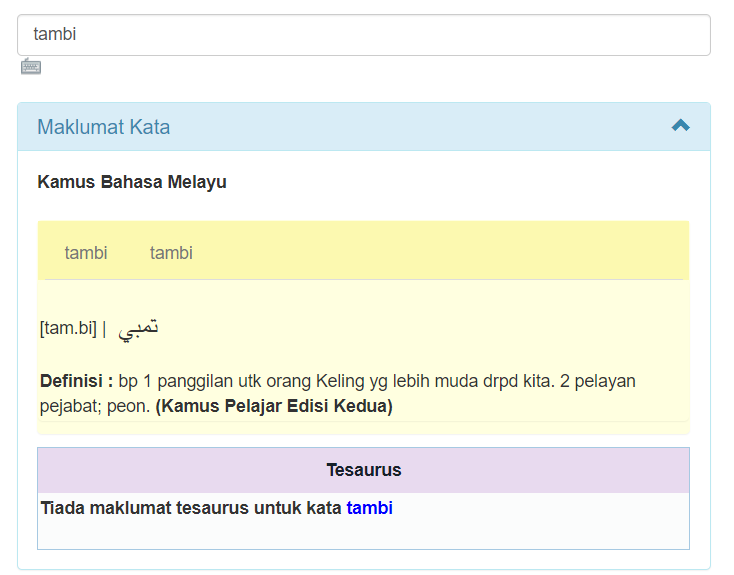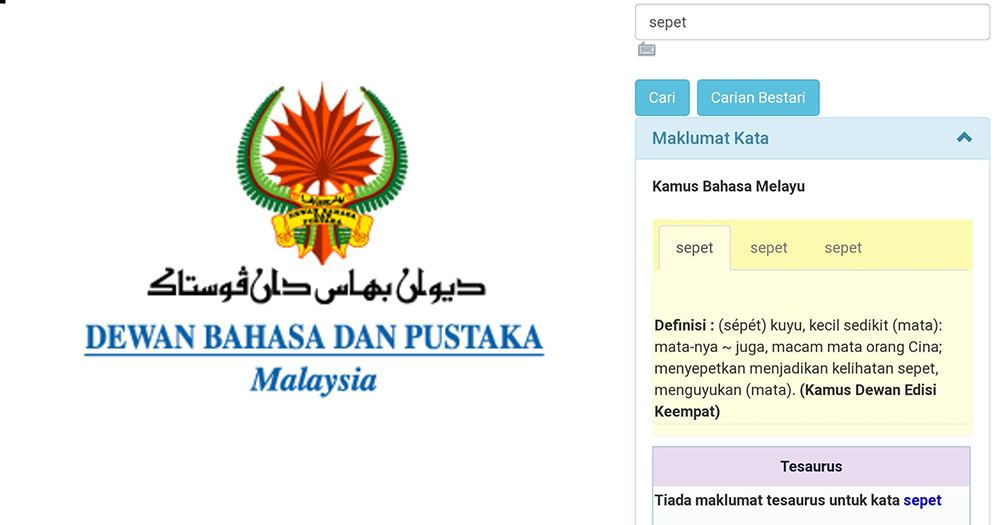Here's something to make you narrow your eyes: A Malaysian government body has raised eyebrows by defining the word sepet (Malay for "squinty") as, "Slightly small eyes, like the eyes of Chinese people".
The official government body, Dewan Bahasa dan Pustaka (DBP), oversees the use of the Malay language in the country.
The definition of sepet can be found on the organisation's website,
 Source: Screenshot from Dewan Bahasa dan Pustaka Malaysia
Source: Screenshot from Dewan Bahasa dan Pustaka Malaysia
Not the first time words given racial definitions
This is not the first time the DBP has provided problematic definitions of words.
The organisation also sparked an uproar over the definition of the word Tambi on its website, which included a derogatory term for Indians in the first meaning of the word.
 Source: Screenshot from Dewan Bahasa dan Pustaka Malaysia
Source: Screenshot from Dewan Bahasa dan Pustaka Malaysia
Translation: "A word used to refer to a keling person younger than us."
DBP refuses to apologise
The definition subsequently drew outrage from Malaysian Indian politicians who pointed out that Tambi was not even a Malay word in the first place.
In response, the DBP's director-general, Abang Sallehuddin Abg Shokeran, said that the organisation would not be apologising as the issue was linked to a past edition of the dictionary and that it did not have the intention to insult Indians, Free Malaysia Today reported.
This drew a call for Sallehuddin's resignation from P Ramasamy, an Indian politician in the Democratic Action Party (DAP).
In calling the director-general's refusal to apologise "shocking and irresponsible", he said:
"The quarrel is not on the word’s historical linkage but why it was equated with the word tambi. Tambi is a Tamil word but keling is not.
It’s not too late for Abang Sallehudin to apologise to the Indian community. Apologising should not be construed as a display of weakness, but a responsible act. If Abang Sallehudin fails to apologise, it is best he should resign from his position."
DBP: Keling was only used in student version
The organisation also put up a Facebook post on March 22, explaining that a dictionary records words that has been absorbed from other languages.
It added that Tambi is a word often used in the Malay language and has been listed in three versions of its Kamus Dewan dictionaries — the original (Kamus Dewan), one for students (Kamus Pelajar), and the prime dictionary (Kamus Dewan Perdana).
The DBP also highlighted that the term keling was only found in the student version, which was published in 1987, while the other two versions used "Indian people" in its explanation.
The student version was then updated in 2007, but only for the purpose of adding more words, so the term remained.
In the meantime, the DBP is updating and compiling the third edition of the dictionary, the statement further said.
Abang Sallehuddin was quoted by Malaysiakini as saying:
"The online dictionary will be updated. The word keling will be replaced with 'India' (for definitions) in line with the more recent dictionaries published by DBP."
The Facebook statement also pointed out that the DBP had attempted to educate the public on the status of keling as a derogatory word for Indians in the 1989 and 1994 version of the original Kamus Dewan.
Top image collage from DBP Facebook and website
If you like what you read, follow us on Facebook, Instagram, Twitter and Telegram to get the latest updates.
